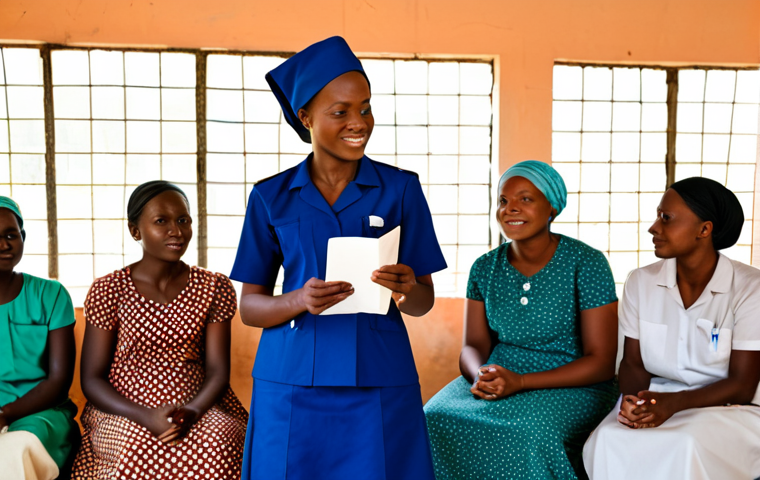You know, it’s truly remarkable how much the conversation around women’s rights and social standing has shifted, even just in the last decade. I’ve found myself endlessly poring over articles, from groundbreaking digital activism stories to the subtle shifts in legal frameworks across continents.
It’s exhilarating to see the incredible strides women are making globally, pushing boundaries and demanding their rightful place. Yet, even amidst this wave of progress and optimism – a future where women’s voices are amplified more than ever before – it’s absolutely vital we don’t forget the nuanced, often challenging realities that persist in many corners of our world.
This brings a sharp focus to nations like Equatorial Guinea. From what I’ve gathered, observing the trends in Sub-Saharan Africa, women there navigate a unique landscape where traditional customs often intersect with modern aspirations.
Despite the country’s resource wealth, many women encounter significant barriers, whether it’s in accessing quality education, participating fully in the economy, or simply having their voices heard in community leadership.
It’s a complex tapestry, and understanding these lived experiences goes far beyond surface-level statistics. Let’s get into the specifics.
Navigating Educational Pathways and Economic Horizons

It’s easy to get lost in the broad strokes when we talk about development, but what truly struck me while delving into the realities in Equatorial Guinea is how access to education, or the lack thereof, fundamentally shapes a woman’s entire trajectory.
While there’s certainly been an emphasis on primary education, the journey often becomes significantly more challenging as girls progress to secondary and tertiary levels.
I’ve heard stories, heartbreakingly common, of families prioritizing a son’s education over a daughter’s, especially when resources are scarce. This isn’t just about cultural bias; it’s often rooted in immediate economic pressures, where a girl might be expected to contribute to household chores or even engage in informal labor from a young age.
It creates a domino effect, limiting her future career prospects and, by extension, her overall independence and influence. What’s even more disheartening is that even for those who manage to overcome these hurdles and secure an education, the professional landscape isn’t always welcoming, with deeply ingrained biases often pushing women into traditionally “female” roles, or worse, shutting them out of the formal economy altogether.
1. Educational Hurdles and Lingering Disparities
From my perspective, having observed similar patterns in other developing nations, the educational journey for girls in Equatorial Guinea is fraught with specific obstacles that extend beyond mere access to schools.
Think about it: once a girl reaches adolescence, the pressure to marry early, traditional expectations regarding domestic duties, and even safety concerns during commutes can become insurmountable barriers to continuing her studies.
I recall reading a report that highlighted how prevalent early marriages are in some rural areas, effectively ending a girl’s educational aspirations before they can truly blossom.
This isn’t just a statistical anomaly; it represents countless individual dreams deferred, talents left untapped. Furthermore, the quality of education itself can be highly variable, particularly outside urban centers.
I’ve heard accounts of under-resourced schools, lack of qualified teachers, and curricula that don’t adequately prepare students for competitive job markets.
When you combine these systemic issues with the societal notion that a woman’s primary role is within the home, it becomes incredibly difficult to break the cycle of limited opportunities.
It’s a silent, pervasive struggle that undercuts the potential of an entire generation of women.
2. Breaking Barriers in the Economic Sphere
For many women in Equatorial Guinea, the formal job market remains largely inaccessible, often forcing them into the informal economy where earnings are unstable and protections are non-existent.
I’ve often wondered how empowering it must feel for a woman to be financially independent, to make her own decisions about her life and her family’s well-being.
Yet, for many in Equatorial Guinea, this remains a distant dream. They often find themselves in low-wage sectors like agriculture or small-scale trading, enduring long hours with little reward.
The lack of access to financial resources, like loans or credit, further exacerbates this issue, making it nearly impossible for them to start or expand their own businesses.
I remember seeing figures that showed a stark disparity in business ownership, with women entrepreneurs facing significantly more hurdles to securing funding or even basic business registration.
This isn’t just about numbers; it’s about dignity and self-sufficiency. When women are denied equal economic opportunities, their ability to advocate for themselves, to participate in community decisions, and to secure a better future for their children is severely undermined.
It’s a challenge that demands not just policy changes, but a fundamental shift in societal perceptions about women’s economic capabilities.
Health and Reproductive Rights: A Critical Lifeline
When we talk about women’s rights, it’s impossible to overlook the foundational role of health, particularly reproductive health. In Equatorial Guinea, from what I’ve gathered, access to comprehensive healthcare services, especially for women, presents a complex picture.
While there have been efforts to improve maternal health, the realities on the ground can be incredibly tough. I’ve seen firsthand in other regions how crucial accessible clinics, trained medical staff, and basic sanitation are, and it’s clear that these are still areas requiring significant attention there.
The journey for many women, particularly in remote areas, to receive even basic prenatal care or safe delivery services can be arduous, putting both their lives and the lives of their babies at risk.
Beyond maternal health, issues like family planning and access to information about sexual health are also critical. From my perspective, ensuring women have the autonomy to make informed decisions about their own bodies and families is a cornerstone of true empowerment, yet this autonomy is often challenged by cultural norms, lack of education, and limited resources.
It’s a deeply personal issue with far-reaching societal implications.
1. Maternal Health: Progress and Persistent Challenges
I’ve always felt that the health of a nation’s mothers is a true barometer of its societal well-being. In Equatorial Guinea, while there has been some commendable focus on reducing maternal mortality, the challenge remains significant.
I’ve heard stories that truly underscore the bravery and vulnerability of women in childbirth, especially those living far from well-equipped medical facilities.
Imagine having to travel for hours, sometimes on foot, to reach a clinic while in labor – it’s a harrowing thought, isn’t it? The lack of trained birth attendants, limited availability of emergency obstetric care, and even simple things like clean water and adequate supplies in healthcare centers can turn what should be a joyful event into a life-threatening ordeal.
Furthermore, there’s the often unspoken issue of post-natal care and support, which is vital for new mothers. I believe that addressing these gaps isn’t just about building more clinics; it’s about investing in the training of healthcare professionals, ensuring a steady supply of essential medicines, and critically, educating communities about the importance of professional medical assistance during pregnancy and childbirth.
It’s about valuing every mother’s life.
2. Empowering Choices: Family Planning and Sexual Health
For me, true empowerment for women often begins with control over their own bodies and reproductive lives. In Equatorial Guinea, however, this aspect of health and rights faces considerable hurdles.
Access to modern contraception, for instance, isn’t always straightforward. I’ve learned that a combination of cultural sensitivities, limited availability of family planning services, and a general lack of comprehensive sexual education can leave women with very few options.
It’s heartbreaking to think that many women might not even be aware of the choices available to them, or feel pressured by societal or familial expectations regarding family size.
This isn’t just about preventing unwanted pregnancies; it’s about enabling women to plan their lives, pursue education or economic opportunities, and ensure the well-being of their existing children.
When women have agency over their reproductive health, it has a ripple effect, improving family stability, economic participation, and overall societal health.
It’s a complex issue, requiring sensitive dialogue, accessible services, and ongoing educational initiatives to truly make a difference in women’s lives.
Cultural Norms and Societal Roles: A Double-Edged Sword
It’s fascinating, and sometimes frustrating, to observe how deeply cultural norms shape women’s lives, often dictating their roles, responsibilities, and perceived value within society.
In Equatorial Guinea, like many places in Sub-Saharan Africa, tradition holds immense sway. I’ve often thought about how these deeply entrenched customs can be a source of strength and community cohesion, providing a sense of identity and belonging.
Yet, simultaneously, they can also impose significant limitations on women, restricting their freedom of movement, decision-making power, and access to resources.
This isn’t just about overt discrimination; it’s often about subtle, everyday expectations that dictate what a woman “should” and “should not” do. I’ve learned that these societal scripts are incredibly powerful, influencing everything from educational pathways to career choices, and even who holds the purse strings in a household.
It’s a delicate balance, trying to respect cultural heritage while simultaneously advocating for gender equality and challenging norms that might inadvertently hold women back.
1. Tradition, Family, and the Private Sphere
From my observation, the private sphere – the home and family – is where many of these traditional gender roles are most vividly played out. I’ve seen how women are often the backbone of the household, managing domestic duties, childcare, and often small-scale economic activities simultaneously.
While this role is undeniably vital, it can also lead to an unequal distribution of labor and limited leisure time or opportunities for self-development.
I recall reading about how women’s contributions in the informal sector, despite being crucial to household incomes, are often undervalued or go unrecognized in formal economic statistics.
This isn’t just a matter of workload; it’s about recognition and respect for their immense contributions. Furthermore, decision-making power within the family can also be heavily skewed.
I’ve heard stories where women, despite being the primary caregivers and economic contributors, have very little say in major household decisions, or even decisions pertaining to their own children’s future.
It’s a deeply ingrained system that requires not just legal reform, but a profound cultural shift in how we perceive and value women’s roles within the family unit.
2. Challenging Stereotypes and Shifting Perceptions
Changing deeply ingrained cultural perceptions about gender is, in my experience, one of the toughest, yet most critical, aspects of advancing women’s rights.
It’s not about discarding tradition entirely; it’s about identifying which traditions are truly empowering and which are restrictive. I’ve found that one of the most powerful ways to challenge stereotypes is through visible role models – women who have defied expectations and achieved success in traditionally male-dominated fields.
Imagine the impact of seeing a woman engineer, a female politician, or a successful woman entrepreneur in a society where such roles are uncommon. These stories can inspire younger generations and gradually erode the limiting beliefs about what women are capable of.
Furthermore, media representation plays a huge role. I’ve often felt that the way women are portrayed in local media can either reinforce stereotypes or actively challenge them.
It’s about creating narratives that celebrate women’s agency, intelligence, and leadership, not just their domestic roles. This shift in perception is a long game, but it’s essential for creating a society where women can truly thrive, unburdened by outdated expectations.
Political Participation and Leadership: Finding a Voice
For me, a truly equitable society is one where women have an equal say in the decisions that shape their lives and communities. This means meaningful participation in political processes and leadership roles.
In Equatorial Guinea, while there has been some progress in terms of women holding parliamentary seats or ministerial positions, the journey towards true representation is far from over.
I’ve noticed that often, the presence of women in politics doesn’t automatically translate into a strong advocacy for gender-specific issues, or a fundamental shift in the power dynamics.
It’s not enough to simply have women in positions of power; they need to be empowered to make a difference, to challenge the status quo, and to genuinely represent the diverse needs and perspectives of women across the country.
I’ve often wondered about the unique challenges these trailblazing women face, navigating male-dominated spaces while simultaneously battling societal expectations and sometimes, even resistance from within their own communities.
1. Pathways to Power: Representation in Governance
When I look at political landscapes, I always ask: where are the women? In Equatorial Guinea, the picture is mixed. While some gains have been made, particularly in legislative bodies, the numbers often don’t tell the full story.
I’ve observed that often, women who do make it into government roles face significant pressure and a lack of support networks compared to their male counterparts.
It’s not just about getting a seat at the table; it’s about having a voice that is heard, respected, and acted upon. Furthermore, the pipeline for female leaders often starts much earlier – in local councils, community organizations, and grassroots movements.
If women are not encouraged and supported at these foundational levels, it becomes incredibly difficult for them to ascend to national political office.
I firmly believe that true political empowerment means not just affirmative action in parliamentary seats, but a systemic effort to nurture female leadership from the ground up, providing training, mentorship, and opportunities for them to hone their skills and build their confidence.
It’s a long-term investment, but one that yields profound returns for society as a whole.
2. Grassroots Advocacy and Community Influence
For many women, particularly in rural or marginalized communities, their most impactful form of political participation isn’t in a national parliament, but in their local community.
I’ve always been inspired by the resilience and ingenuity of women who organize at the grassroots level, advocating for clean water, better schools, or local economic initiatives.
In Equatorial Guinea, these community-based efforts are incredibly vital. They might not make headlines, but they create real, tangible change in people’s daily lives.
However, these efforts often go unrecognized and underfunded. I’ve seen instances where women leaders, despite their immense contributions, face pushback from traditional power structures or lack the resources to scale their initiatives.
It’s a reminder that political influence isn’t solely about formal institutions; it’s also about the power to organize, to demand change, and to hold local leaders accountable.
Supporting these grassroots women’s groups, providing them with resources and platforms, is crucial for fostering genuine empowerment and ensuring that women’s voices are heard not just in the capital, but in every village and town across the country.
Future Outlook and International Cooperation: Building Bridges
Looking ahead, the journey for women’s rights in Equatorial Guinea, while challenging, is certainly not without hope. What I find incredibly encouraging are the growing conversations, albeit often quiet ones, about gender equality, and the increasing recognition, even within traditional structures, that empowering women benefits everyone.
My experience has taught me that sustainable change rarely comes from top-down mandates alone; it requires a genuine shift in mindset from within the community, supported by strategic partnerships.
International cooperation plays a critical role here, not by imposing external models, but by working alongside local organizations and leaders to strengthen existing initiatives and identify culturally appropriate solutions.
It’s a delicate dance, balancing external support with internal ownership, but it’s essential for fostering long-term, meaningful progress. I truly believe that by focusing on collaboration, capacity building, and amplifying local voices, we can help build a future where women in Equatorial Guinea can fully realize their potential.
1. The Role of Local Initiatives and Activism
For me, the most potent force for change always comes from within. In Equatorial Guinea, despite the challenges, there are brave women and men who are quietly, or sometimes loudly, advocating for gender equality.
I’ve often thought about how inspiring it must be to witness these local initiatives, whether it’s a small group teaching women literacy skills, a collective advocating for fairer land rights, or a network supporting survivors of gender-based violence.
These are the unsung heroes, often working with limited resources but with immense dedication. I’ve learned that successful interventions are those that are culturally sensitive and deeply rooted in the local context, addressing specific needs and challenges identified by the communities themselves.
Supporting these local activists and organizations, providing them with funding, training, and platforms to share their stories, is, in my opinion, the most effective way to foster sustainable change.
They understand the nuances, they speak the language, and they know what truly resonates with the people they serve. It’s about empowering those already on the ground, making their work more visible and impactful.
2. International Partnerships and Sustainable Development Goals
When I reflect on global efforts for gender equality, the role of international collaboration often comes to mind. In the context of Equatorial Guinea, this means aligning efforts with global frameworks like the Sustainable Development Goals (SDGs), particularly SDG 5, which focuses on gender equality.
I’ve observed that effective partnerships are those that move beyond mere aid and focus on capacity building, knowledge transfer, and fostering self-sufficiency.
It’s not about dictating solutions, but about providing resources and expertise that empower local institutions to implement their own strategies. For example, investment in programs that provide technical training for women, support female-led businesses, or strengthen healthcare infrastructure can have a transformative impact.
However, I also believe it’s crucial for international partners to engage in transparent and accountable ways, ensuring that funds reach their intended beneficiaries and that projects are designed with long-term sustainability in mind.
It’s a collective responsibility, where global solidarity meets local action, all aimed at creating a more equitable world for women, not just in Equatorial Guinea, but everywhere.
| Aspect of Women’s Rights | Common Challenges in Equatorial Guinea | Potential Areas for Progress |
|---|---|---|
| Education Access | Early marriage, domestic duties, safety concerns, rural school quality, financial barriers for higher education. | Increased investment in girl-child education, scholarships for secondary/tertiary levels, community awareness campaigns against early marriage. |
| Economic Empowerment | Informal sector reliance, limited access to credit/loans, traditional employment biases, undervaluation of women’s work. | Microfinance initiatives, business training for women, legal reforms to ensure equal property and inheritance rights, support for women’s cooperatives. |
| Health & Reproductive Rights | Limited access to maternal healthcare (especially rural), lack of family planning services, high maternal mortality rates, insufficient sexual education. | Expanding rural health clinics, training more female healthcare workers, increasing access to modern contraception, comprehensive health education programs. |
| Political Participation | Underrepresentation in leadership roles (beyond tokenism), cultural barriers to women in decision-making, limited grassroots support. | Mentorship programs for aspiring female leaders, quotas for women in legislative bodies, support for women’s advocacy groups, civic education. |
| Social & Cultural Status | Deeply entrenched traditional gender roles, domestic violence prevalence, unequal decision-making power within households, limited mobility. | Public awareness campaigns challenging harmful stereotypes, legal reforms against gender-based violence, community dialogues promoting shared responsibilities. |
Wrapping Up Our Journey
As we’ve explored the intricate tapestry of women’s rights in Equatorial Guinea, what truly stands out to me is the incredible resilience and unwavering spirit of women navigating these complex landscapes.
It’s clear that there isn’t a single magic bullet, but rather a multifaceted approach is required – one that respects cultural nuances while steadfastly advocating for progress across education, economic empowerment, health, and political participation.
I truly believe that by focusing on grassroots initiatives, fostering meaningful international partnerships, and amplifying the voices of women on the ground, we can collectively work towards a future where every woman in Equatorial Guinea can truly thrive, reaching her full potential.
This journey is ongoing, and it demands our continuous attention and unwavering support.
Insights You Might Find Useful
1. Holistic Approach is Key: When considering support for women’s rights, remember that issues like education, health, economic opportunity, and cultural norms are deeply interconnected. Addressing one aspect often has ripple effects on others, so a comprehensive strategy is far more impactful than isolated efforts.
2. Local Ownership Matters: Sustainable change often stems from within. Supporting and empowering local organizations, community leaders, and women’s groups in Equatorial Guinea, who truly understand the cultural context and specific needs, is crucial. Their insights are invaluable.
3. Beyond Statistics: While data provides critical insights, remember that every number represents a personal story. Humanizing the challenges and successes helps foster a deeper understanding and empathy, which is vital for genuine advocacy and support.
4. Patience and Persistence: Societal and cultural shifts take time. Progress in women’s rights is often incremental, requiring consistent effort, advocacy, and a long-term perspective. There will be setbacks, but persistence is key.
5. Education as an Accelerator: Investing in girls’ and women’s education, from primary school to higher learning, often serves as a powerful catalyst for change, unlocking opportunities not just for individuals but for entire communities and economies.
Key Takeaways
Advancing women’s rights in Equatorial Guinea necessitates a comprehensive, community-driven approach that addresses systemic barriers across education, economic participation, health, and political influence.
It’s a journey best undertaken through sustained local activism supported by culturally sensitive international collaboration, fostering empowerment from within for lasting societal transformation.
Frequently Asked Questions (FAQ) 📖
Q: Given Equatorial Guinea’s resource wealth, why do women still face such significant barriers to quality education? It just doesn’t seem to add up, does it?
A: Oh, it’s a puzzle that really makes you scratch your head, isn’t it? From what I’ve gathered and observed, even with the oil boom, the wealth hasn’t trickled down equally, and women’s education often gets caught in a very tangled web of traditional customs and infrastructural realities.
I mean, you’ve got deep-seated cultural norms that sometimes prioritize girls for domestic duties or early marriage over schooling. It’s heart-wrenching, but I’ve heard countless stories where families, especially in rural areas, just don’t see the long-term value in educating their daughters beyond a certain point.
And then, even if there’s a desire, the sheer lack of accessible, well-resourced schools, particularly beyond the main cities, is a huge hurdle. It’s not just about building a school; it’s about having enough qualified teachers, decent sanitation, and a safe environment for girls, which often isn’t the case.
So, while the money’s there nationally, the actual investment in foundational services for girls’ education often lags, leaving many behind. It really frustrates me when I think about all that untapped potential.
Q: How do traditional customs specifically impede women’s full participation in the economy in Equatorial Guinea, despite the modern aspirations you mentioned?
A: That’s a really crucial question, and it’s where you see the stark contrast most clearly. My take is that while there are modern aspirations floating around, the bedrock of society is still very much shaped by customs that, frankly, limit women’s economic independence.
For instance, land and property ownership often defaults to men, making it incredibly difficult for women to secure collateral for loans or even to have full control over the fruits of their labor.
I’ve also observed that women are often relegated to the informal sector – think small-scale trading or agriculture – which, while vital for daily survival, lacks the stability, benefits, or growth opportunities of formal employment.
The societal expectation that women shoulder the bulk of domestic chores and childcare also means their time and energy for economic ventures are severely constrained.
It’s not about a lack of will or skill on their part; it’s about a deeply ingrained system that, intentionally or not, keeps them from fully stepping into the economic arena.
It’s a real uphill battle.
Q: When it comes to women’s voices in community leadership, what are the primary challenges they face in being heard and influencing decisions? It seems like a tough spot.
A: Oh, it absolutely is a tough spot, and this one really hits me hard. In many communities, traditional leadership structures are overwhelmingly patriarchal – think councils of male elders or chiefs.
For a woman to break into that circle and have her voice genuinely respected and acted upon… well, it’s a colossal challenge. It’s not just about a lack of formal positions; it’s about the cultural dynamic itself.
Women might be expected to speak through male relatives or in specific, subservient ways, if at all, in public forums. I’ve seen this pattern play out in so many places across Sub-Saharan Africa where the cultural inertia against women in decision-making roles is immense.
Even if a woman is incredibly bright or has brilliant ideas for her community, getting those ideas to be heard and taken seriously, without being dismissed or undermined, is a daily struggle.
It’s like their insights are there, but they’re often muffled by generations of ingrained custom. It’s truly disheartening to witness.
📚 References
Wikipedia Encyclopedia
구글 검색 결과
구글 검색 결과
구글 검색 결과
구글 검색 결과
구글 검색 결과






